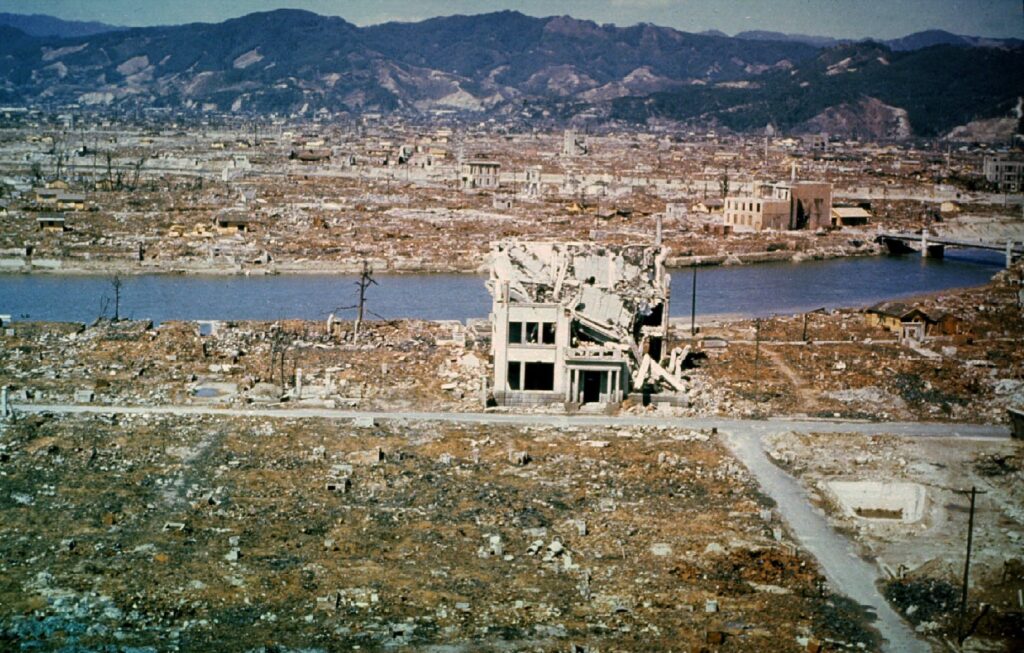
On the 80th anniversary of the atomic bombing of Hiroshima, Catholic groups and others warned that eight decades have not diminished the dangers of nuclear weapons.
During the Second World War, on August 6, 1945, the American bomber Enola Gay dropped “Little Boy,” which exploded with a force equivalent to 15,000 tons of TNT, over the city of Hiroshima, in southwestern Japan. It was the first use of a nuclear weapon in history. On August 9, a second, similar bomb was dropped on another Japanese city, Nagasaki. Japan announced its surrender on August 15, ending the war.
More recently, Russia has threatened to use nuclear weapons throughout its war of aggression with Ukraine, and in June, a joint U.S.-Israeli strike on Iran sought to blunt that country’s development of nuclear weapons.
A demonstration in front of the Consulate of Japan on August 5 gathered various anti-nuclear and pro-peace groups ahead of the anniversary, including Pax Christi, the Catholic peace and justice movement that began after World War II. The danger of nuclear weapons now is no less than it was in 1945, according to Rosemarie Pace, statewide coordinator for New York for Pax Christi.
“Most people do tend to think it’s not a pressing issue because it’s not in our face, it’s not there. Even climate change, although people are ignoring it or denying it, we do see that. We’re seeing these horrific storms, floods, droughts, whatever. And even that doesn’t get people motivated. So nuclear weapons are a hard sell, in a sense, to get people to realize how dangerous they are and how very present they are in our world now,” she told The Good Newsroom on the sidelines of the demonstration.
An annual vigil spanning New York to Nagasaki
To commemorate both the Hiroshima and Nagasaki bombings, the Community of Sant’Egidio, founded in Rome in 1968, is holding a 75-hour prayer vigil between New York and Nagasaki, spanning the period between the two atomic attacks, at the Chapel of the Sacred Heart of Jesus and Mary on 33rd Street in Manhattan, and the Chapel of Our Lady of Nagasaki in the Urakami Basilica, respectively.
The fourth annual vigil has additional meaning on the 80th anniversary, Paola Piscitelli, president of the Community of Sant’Egidio USA, told The Good Newsroom by phone. “It is an occasion to pray for peace, to remember the victims, the survivors, the children of both, and all the pain caused by the war,” she said. “We are imploring God for peace.”
The vigil is taking place from 8 a.m. to 8 p.m. in each of the two cities, with livestreams available from both locations. Prayers from 70 countries, received from the faithful who cannot attend, are read out each hour. The Community of San’Egidio prays for peace each month, and sees it as one of three “P’s” that Pope Francis asked the group to address: “prayer, the poor, and peace,” Piscitelli said.
Pope Leo XIV calls for a peace that is “unarmed and disarming”
Earlier on Wednesday, Pope Leo prayed that the 80th anniversary of the bombings would “serve as a call to the international community to renew its commitment to pursuing lasting peace for our whole human family — ‘a peace that is unarmed and disarming,'” he said, quoting a phrase he used when addressing the crowd in St. Peter’s Square immediately after his election May 8.
Author Charles Pellegrino, whose bestselling book “Ghosts of Hiroshima” was published on August 5, said his title refers not to historical figures, but possibly to ourselves. “Unless we are very careful, we are the ghosts of Hiroshima,” he told The Good Newsroom by email.
Pellegrino said that near-misses with nuclear weapons, such as accidents involving airplanes carrying them, have already occurred, and that the proliferation of weapons simply increases the likelihood of an unintentional nuclear detonation.
“If we are unwise, then we are setting ourselves up to become a civilization victimized by its own mathematics. A pity, because we are approaching technology enabling us to do much better than merely survive – but to excel,” Pellegrino wrote.
Pellegrino is not Catholic, though his sentiments echo those of Pope Leo XIV – and every other pope since the beginning of nuclear proliferation – calling for nuclear disarmament.


